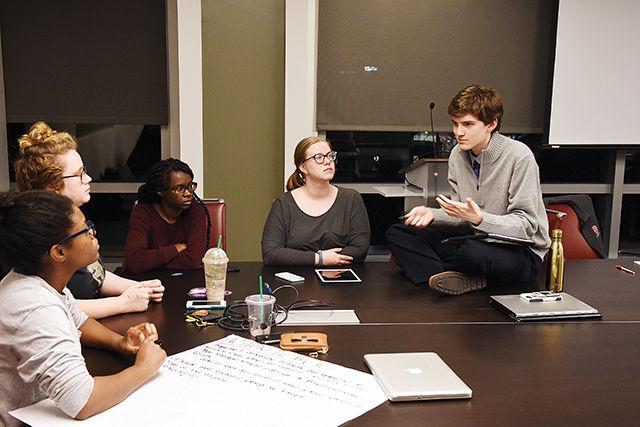After a town hall meeting on the campus racial climate last month, Student Government leaders hosted a second meeting on Tuesday to follow up on the action items discussed.
Student leaders began meeting with administrators and making plans to execute action items after the first racial climate town hall. Many argued at the meeting in January that the action items were not specific enough as to how they would be carried out. This meeting offered the opportunity to discuss more in-depth solutions.
Student Body President Khari Cyrus addressed the racial climate town halls, saying, “I never want to sit there and hear administrators talk at us. I think this was an opportunity to get some of the action items, some of the personal statements, testimonials out there so the [administration] can hear where people are coming from … moving forward to not focusing on what they’re already doing but trying to come up with new things.”
Action Item One
The town hall determined that student organizations could play a key role in promoting dialogue across cultural boundaries on campus. The challenge for those working on this task is to find a way to encourage dialogue without making it a requirement that would feel disingenuous.
Mitchell Moravec, a senior studying psychology and a cohort member at the Women’s Center, cited the current basic requirements for organizations to receive student fees as an opportunity to include programs that promote diversity training.
“If we say social justice is a basic need and requirement then translating that to the process and sending your [organization leaders] a list of approved programs from OIED to apply for student organization funds then that’s what we can do as a student government,” said Moravec, a student senator.
Other solutions offered were meet-and-greets between the more than 600 student organizations on campus to encourage them to come up with joint events between groups that wouldn’t have worked together in the past.
Action Item Two
The Pack Pride presentation at orientation is also considered an area for improvement, as students regard it as disengaging. During the presentation, orientation leaders stand on stage and read from a script reasons to be proud of being a member of the Wolfpack, according to Darryl Johnson, a junior studying mechanical engineering and associate director of diversity outreach in Student Government.
The reviews for this program were positive, according to Johnson, but because so many topics are covered and because of the way that it is presented, diversity is thrown in as an afterthought rather than being a core focus.
“Being proud of how diverse NC State is in the video — it’s in there to be inclusive, it’s in there to have pride at a football game, it’s in there to have pride about going to class and being academically excellent, but it’s all in there, and it’s 16 people reading off of a script for 20 minutes,” Johnson said.
Members discussed bringing in Arts NC State and other groups to contribute to creating a more engaging presentation.
“I just don’t want people reading off of a script,” Johnson said. “I feel like you lose some of the genuine feeling for like, ‘Hey, this campus cares about diversity,’ when you have people reading off a script about how it cares about diversity.”
Action Item Three
One way discussed to combat issues of discrimination and nonacademic misconduct amongst students is to create a new honor court. This honor court, which is similar to an existing honor court at UNC-Chapel Hill, would hold a diverse student board where students who feel mistreated can hold a conversation with other students to deal with the issue.
Diversity Activities Chair for University Activities Board Kam Risku lead the discussion for action item four and how it would not punish students, saying, “ This is a teachable learning experience rather than a punishment.”
Risku went on to say that even though these situations might make some students uncomfortable, it’s worth it to bring solutions to those who feel uncomfortable every day.
The next step to establishing the new honor court is to discuss plans with Director of the Department of Student and Community Standards Paul Cousins.
Action Item Four
Currently, Asian Students in Alliance is the only diversity group on campus without an assistant director in Multicultural Student Affairs. As the second largest minority group on campus, ASIA adopted the fourth action item, which requires an ASIA representative on the Multicultural Student Affairs board.
During the town hall meeting Tuesday, Nina Ondona, a student representative of ASIA, addressed its search for an assistant director, saying that the budget for ASIA is what is preventing them from moving forward and hiring an assistant director.
According to Ondona, this has been an effort for more than three years, but they hope to see an assistant director for ASIA as early as the 2016 fall semester.
In the meantime, Ondona suggested that Asian-American students reach out to other groups on campus, including MSA and other college diversity officers.








